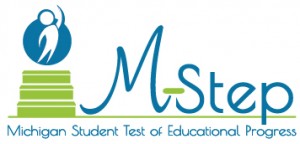|
MDE News Release
Contact: Martin Ackley, Director of Public and Governmental Affairs, (517) 241-4395
Caleb Buhs, Michigan DTMB, (517) 241-7422
State Awards Future College Assessment to College Board’s SAT for Michigan Students
January 7, 2015
LANSING –- All Michigan high school juniors will begin taking the SAT as the state-administered college assessment exam beginning in 2016 after the College Board won the three-year competitively-bid contract, the Michigan Department of Education and Department of Technology, Management and Budget jointly announced today.
The College Board administers the SAT, a globally-recognized college admission test that lets students show colleges what they know and how well they can apply that knowledge. It tests students’ knowledge of reading, writing and math — subjects that are taught every day in high school classrooms in Michigan.
ACT, Inc. will continue to provide its WorkKeys assessment for all high school students. Both the college entrance assessment and work skills tests are required in state law to be provided free to all high school students, and each is periodically competitively bid through the state’s structured procurement process, as directed by the Department of Technology, Management and Budget (DTMB).
“The College Board’s SAT test is respected and used around the country,” said State Superintendent Mike Flanagan, “and Michigan high schools work with them now through their Advanced Placement program that helps students earn college credits while in high school.
“Their bid was rated the highest; provides valuable assistance to Michigan educators, students, and parents; is more aligned to Michigan’s content standards; and saves the state millions of dollars over the course of the three-year contract,” Flanagan said.
The College Board’s bid was $15.4 million less over the three-year contract than the next bidder and scored 10 percentage points higher by the Joint Evaluation Committee (JEC). In addition to staff from MDE and DTMB, the evaluation committee also included members representing the education community, including a high school principal; local school superintendent; a testing and assessment consultant from an intermediate school district; and a vice president from a Michigan community college.
Bill Barnes, principal at Charlotte High School and member of the JEC said: “The attention to detail with which the College Board created its proposal and the extensive resources that it will provide to schools and students to help them prepare for the test, make its college readiness assessment the best choice for Michigan.”
Another member of the Joint Evaluation Committee, Jim Gullen, a data and evaluation consultant for the Macomb Intermediate School District, said: “After two days of review and discussion, there was no question that College Board put forth the best proposal. Considering the quality of College Board’s proposal, the value presented in the pricing, and our current legislation, it is a good time to transition to the SAT to assess Michigan’s high school students’ mastery of the Michigan curriculum.”
Each year, the College Board helps more than seven million students prepare for a successful transition to college through programs and services in college readiness and college success — including the SAT and the Advanced Placement program. The organization also serves the education community through research and advocacy on behalf of students, educators and schools.
The Michigan Department of Education (MDE) is forming a team that will include the local, regional, and community college members of the Joint Evaluation Committee to assist in the transition to the SAT. In addition, the department will hold an onsite meeting with the College Board to discuss how it intends to positively affect the transition for Michigan schools, educators, parents, and students.
In its successful bid, the College Board included the following value-added components that will benefit Michigan schools and families:
- Beginning in Spring 2015, the College Board will provide all schools and students with free test prep materials and online practice tests to help students prepare for the redesigned SAT in 2016.
- Professional Development
- In-person and technology-based training for local test administrators, proctors, and technology coordinators
- Professional development for teachers, students, and parents in understanding the new SAT and analyzing test results
- Professional development for post-secondary enrollment professionals in using the data/resources for admissions and financial aid decisions
- An updated and relevant assessment
- Redesigned SAT beginning in 2016
- Aligned to Michigan content standards, evidence-based design
- Additional item types beyond multiple choice
- New forms developed each year
- Reports available online
- Simplification and reduction of school staff effort to request testing accommodations
- No need to reapply for testing accommodations if already approved for the Advanced Placement Program, or the PSAT testing for National Merit Scholarship Qualification Test
The college entrance exam and work skills assessment are given free to approximately 115,000 Michigan high school students each year.
ACT WorkKeys is a job skills assessment system that helps employers select, hire, train, develop, and retain a high-performance workforce. This series of tests measures foundational and soft skills and offers specialized assessments to target institutional needs.
As part of ACT’s Work Readiness System, ACT WorkKeys has helped millions of people in high schools, colleges, professional associations, businesses, and government agencies build their skills to increase global competitiveness and develop successful career pathways.
Successful completion of ACT WorkKeys assessments in Applied Mathematics, Locating Information, and Reading for Information can lead to earning ACT’s National Career Readiness Certificate (ACT NCRC), a portable credential earned by more than 2.3 million people across the United States.
Michigan high school students have taken the WorkKeys assessment since 2007. Over 413,000 Michigan students have received an NCRC credential.
Although the contracts await final completion and approval of the State Administrative Board, the three-year contract for the college entrance assessment will cost approximately $17.1 million, and the three-year work skills assessment will cost approximately $12.2 million.
|
 Dylan Wiliam is a world-renowned educational leader and researcher, specializing in teacher development and formative assessment. On today’s podcast, Dylan shares the key aspects of formative assessment. He offers his thoughts on teacher development. And he shares some practical ideas to consider for your teaching.
Dylan Wiliam is a world-renowned educational leader and researcher, specializing in teacher development and formative assessment. On today’s podcast, Dylan shares the key aspects of formative assessment. He offers his thoughts on teacher development. And he shares some practical ideas to consider for your teaching.
 In July 2016, Oakland Schools had a significant reorganization. During this reorganization, smaller units were formed from the existing larger departments, and some additional administrative roles were created. A number of these units are part of the District and School Services. Dr. Heidi Kattula is the Executive Director of District and School Services at Oakland Schools.
In July 2016, Oakland Schools had a significant reorganization. During this reorganization, smaller units were formed from the existing larger departments, and some additional administrative roles were created. A number of these units are part of the District and School Services. Dr. Heidi Kattula is the Executive Director of District and School Services at Oakland Schools. We have a few more details about the tests that will be given in the spring, including types of tests at each grade level. A batch of sample items is in production now. This sample will be available “shortly” to all schools and will demonstrate the online functions and tools of the M-STEP.
We have a few more details about the tests that will be given in the spring, including types of tests at each grade level. A batch of sample items is in production now. This sample will be available “shortly” to all schools and will demonstrate the online functions and tools of the M-STEP. Last week, three bills (
Last week, three bills ( As discussed in a
As discussed in a  Legislators in the House are hearing that the 3rd grade retention legislation may come up for a vote before summer break.
Legislators in the House are hearing that the 3rd grade retention legislation may come up for a vote before summer break. Finally, the bill was amended in committee to prohibit MDE from including a social studies component on the grade 3 state assessments or any pilot of that assessment in order to further the goal of reading proficiency.
Finally, the bill was amended in committee to prohibit MDE from including a social studies component on the grade 3 state assessments or any pilot of that assessment in order to further the goal of reading proficiency.